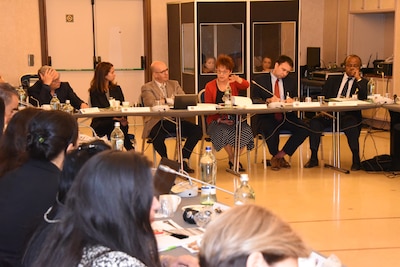By James E. Brooks George C. Marshall European Center for
Security Studies
GARMISCH-PARTENKIRCHEN, Germany, Oct. 13, 2017 — More than
30 diplomats, academics and military officials from the Mediterranean region
gathered Sept. 25-28 in Rome to examine the shared responsibility nations have
for security at a conference hosted by the George C. Marshall European Center
for Security Studies.
"The purpose of this Middle East-North Africa workshop
was to share viewpoints on the shared responsibility and comprehensive security
through partnerships around the Mediterranean Sea," said Dr. Petra
Weyland, Marshall Center professor of Middle Eastern affairs.
"When partners put their understandings of shared
responsibility in security matters on the table -- when they share their thoughts,
experiences and dedication to achieve security -- then true communities of
interest become a reality. Then common efforts to achieve more security for all
become much more effective," Weyland said.
German-American Partnership
The Marshall Center plans, develops and conducts more than
100 nonresident events like this one each year. In October 2016, U.S. and
German defense officials signed a new memorandum of agreement increasing
Germany's role at the center and increasing their investment in the center's
programs with personnel and funds.
One of the focus areas for Germany's defense minister is the
Middle East-North Africa region and the threats of terrorism, regional
conflicts and government instability in North Africa facing southern Europe.
While the Marshall Center has a traditional geographic focus on Europe, its
sister organizations, the Near East South Asia Center for Strategic Studies and
the Africa Center for Strategic Studies, typically take the lead for programs
involving Africa.
Organizers say the Marshall Center workshop was facilitated
by Germany's increased focus on Mediterranean tran-regional security
challenges.
"This event was successfully implemented based on
Germany's increased contributions and political direction. We were glad to have
the Africa Center for Strategic Studies associate professor of counterterrorism
and counterinsurgency, Dr. Benjamin Nickels, be a part of our workshop. This
shows good cooperation between the two organizations," Weyland said.
Regional Security
The three-day Middle East-North Africa workshop featured a
series of moderated discussions. Participants had the opportunity to learn how
others from different nations in the region as well as from different career
fields viewed security in the region, the role of parliamentarians and
politicians, culture, history and more.
"More than half of the participants were women, and the
discussion oftentimes came to the role of gender in security -- the fact that
security oftentimes means different things to men and women living around the
Mediterranean. And this came in a very natural way, and without having the
topic inscribed in the agenda," Weyland said.
Col. Stefan Nievelstein, a military attache at the German
Embassy in Rome, stressed the importance of these discussions with all partners
in the Mediterranean region.
"Today's challenges with regard to our common security
often have their roots in this wider Mediterranean region. For sure, the
solutions to the current migration crisis lie within this region. Exchanging
views and perspectives, sharing or combining of efforts, and striving for
common solutions are imperative, given the scope of the challenge. We have to
combine our work across the board to include political, economic, security and
defense policies -- the comprehensive approach which will pave the way -- as
there is no single-service solution," Nievelstein said.
Future Meeting
Organizers said the post-conference surveys focused on
specific topics the participants wanted to discuss in more detail at a later
conference.
"Participants largely narrowed down their interests
into three main topics: preventing and
countering the foreign fighter threat through education programs, conflict
resolution through diplomatic actions, and preventing conflict," Weyland
said. "Within three workshop days, a very ambitious community of interest
saw the light.
"It may very well make its voice heard in Mediterranean
security matters in the future," Weyland continued, "and the Marshall
Center should do everything possible to help this community to thrive. This
development and the topics suggested by the group will help the Marshall Center
strengthen existing resident programs such as our Seminar on Regional Security
Studies and European Security Seminar-South."
Exact dates and details of the follow-on workshop are in the
early stages, but the initiative continues to have strong support from the
German Defense Ministry as well as the Marshall Center. Organizers said
Tunisia's Education Ministry indicated support for hosting the next conference.







No comments:
Post a Comment